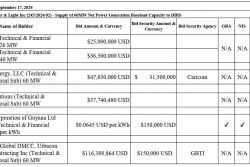Normally when a union signs a pay deal with an employer the assumption is that the members of its executive all endorse the agreement. But the story behind the Guyana Teachers’ Union’s multi-year pact with the government signed on Wednesday defies all the norms, with members of the union’s General Council and even the negotiating team alleging deception, lack of transparency and betrayal on the part of their own side’s signatories.
Following a 75-day strike earlier this year and a little help first from the courts in addition to (rather belatedly) the Chief Labour Officer, negotiations were opened. They ground to a halt, however, on the matter of the years which should be under consideration, the GTU insisting on a retrospective pay deal for 2019-23, and the government holding to the position that it would only discuss 2024-26. Eventually, probably sensibly, the union conceded and agreed to the government’s time-line.
The GTU had originally proposed a salary increase of 39.5% in 2024 for teachers and teacher educators, with 30% increases for 2025 and 2026. The proposal for those on the salary scale TS4 to TS19 was 35% in 2024 and 30% in the subsequent two years. As it is the agreement which has been signed accords a 10% rise for teachers this year with 8% in 2025 and 9% the following year. A clause is included whereby they would also benefit from any higher increases given to public servants during those years.
Also announced among other things was a 156% hike in the Remote Area Incentive which will now be $23,000 per month as opposed to $9,000. It is, of course, intended to attract more teachers to remote regions. There are too increased monthly allowances of $32,000 for those with doctoral degrees, $22,000 for those with master’s degrees and $7,000 for graduates. The clothing allowance has now risen by 88% and allowances for teachers in difficult conditions by up to 67%. Senior teachers will get better duty-free concessions, and there will be a 100% rise in scholarships annually. Teachers who have retired and then return to the profession will be paid at their last salary rate.
The primary issue dividing the union executive and, it has been reported, the membership, is the $10% salary increase. During a press conference GTU General Secretary Coretta McDonald asked how 10% could cushion the cost of living. After accounting for inflation the 10% in real terms only amounted to a 5.5% increase, she said, in addition to which there was a $10,000 shortfall in uniform allowances.
The pact was signed by GTU President Mark Lyte and Vice President Julian Cambridge, who the General Secretary accused of presenting the agreement as being more favourable than it was in actuality. She alleged that they had misled the General Council by not informing them about the terms before the deal was signed, in addition to which the President had decided to sign despite requests for more time to discuss it.
Ms Vanessa Kissoon, who was a member of the negotiating team corroborated what Ms McDonald had to say, claiming, “The president gave our members the impression that his non-salary benefits were all in our favour, which was not so.” She went on to allege that the negotiation team had not been informed of the details until after the General Council had already voted. A potentially critical issue was raised by the General Secretary who adverted to the fact that the names of key officers were missing from the document, and whether as a consequence the agreement was valid under the circumstances.
The hiatus in the union was apparent even before this, however, since as early as last week Ms McDonald had told this newspaper in an interview that the union had officially rejected the government’s 10% pay offer. This rejection followed a meeting between the GTU and the Ministry of Education, when the government was said to have argued there was a lack of fiscal space in the budget for the size of increase being requested. In response we reported Ms McDonald as pointing to the recent supplementary budget of $40.7 billion in the National Assembly and asking why no supplementary budget for teachers was under consideration.
It might be noted that Mr Lyte was absent from the subsequent union meeting which refused to give its imprimatur to the pact, and gave no hint of whether he agreed with the decision to reject the deal, more especially as he had conveyed the general impression at an earlier stage that he was about to accept it. He later gave a live Facebook post, itemising all the progress which had been made on a number of contentious issues such as housing for teachers, but even following this he had no comment to make on the rejection.
Inevitably then, the members of the General Council who had earlier dismissed the government’s offer, would have been nonplussed that it was subsequently accepted without its complete terms being referred to them. Of course we do not have the full details of what transpired, since it could be asked too whether the pact should have been repudiated in the President’s absence in the first place. It is possible that Mr Lyte was less informative about the trend of his thinking in the presence of his colleagues than he could have been because he expected to be outvoted. But then it is not clear to the public how the General Council splits.
On the other side, inevitably the government was delighted, President Irfaan Ali stating that, “From the beginning, I emphasised the need for open dialogue to resolve every issue at the negotiating table.” His memory is a little short, since he was the one who attempted to bypass the union altogether and talk to senior teachers himself in the State House garden with predictably dismal results.
In addition, the government has been relentless in its attacks on the union’s demands as being politically inspired. This is because Ms McDonald in addition to being GTU General Secretary is also an opposition MP, and the current situation will not be helped by the fact that Ms Kissoon is also associated with APNU. The political allegations are what have stood in the way of negotiations from the beginning.
All of that aside, the next developments are not altogether clear. This newspaper has cited reports that teachers across Guyana are mobilising, and will be holding meetings of their various branches to decide on the next course of action. Ms McDonald was quoted as saying, “Membership will decide which is the next avenue,” and that there was no reason to suppose the deal could not be raised or put on hold. The country waits to see what the view of the ordinary teachers is, and whether they will accept the agreement which Messrs Lyte and Cambridge signed. If they don’t, their options are not all that obvious.





